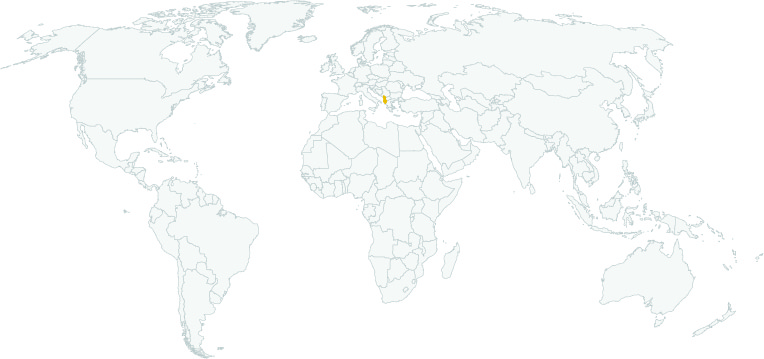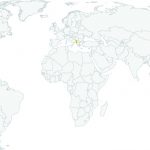
For all their political and economic differences, Bosnia and Herzegovina, Albania, Kosovo, Montenegro, North Macedonia and Serbia share a set of vulnerabilities that make them a favourable environment for organised crime, according to the 2025 Organised Crime Index published on Monday.
The report adds that the rate of environmental crimes, from illegal logging to mineral extraction, is also on the rise in the region thanks to political connections.
Albania has lost about 6.5% of its total forest area over the past 20 years. Research shows that the country’s 2016 moratorium on commercial logging has not stopped the deforestation. Italy is still the country to which Albania exports most timber and paper products.
The article links the illegal logging with Minelli Spa, part of the Italian Minelli Group, over the past 10 years. This company manufactures high-quality wood products, such as stocks for sporting and recreational rifles, handles for brushes, knives and brooms, and components for wooden toys.
Davide Pettenella, professor of forest economics at the University of Padua and former Balkans consultant for the FAO (Food and Agriculture Organization of the United Nations), says that “the EUTR would not stop illegal activity from Albania because the system is created for traceable and legal wood, but in a chain of corruption, which starts with illegal logging and then [continues with] controls at customs, measurements, sales and exports, it is almost impossible.”
Sources from the Italian forestry police admit that they operate mainly on the basis of documentation checks and only conduct random checks in the field every two years.
Despite the 2016 moratorium, illegal logging continues in Albania, fueled by corruption, weak law enforcement, and European demand, particularly from Italy. However, new EU regulations designed to combat this issue risk pushing small businesses toward timber mafias.
According to INSTAT , between 2018 and 2023, Albania lost 320,000 hectares of forest and pastureland (18%), including 82,000 hectares of “pure” forest (7%). In 2023, Global Forest Watch reported a loss of 2,200 hectares, equivalent to 1.01 Mt of CO₂ emissions, marking the “final sprint” of a “massacre” ongoing for over 25 years, largely ignored and facilitated by poor local traceability.
In the official silence, the shrinking percentage of tree-covered land plays a solo tune, despite a 2016 moratorium (Law 5/2016 ) banning exploitation and prohibiting the trade and export of wood products until 2026.
Fines of up to 36,000 euros are imposed, except in three cases: cutting to meet local communities’ firewood needs, forest renewal and cleaning, or changes in land use.
Once the law was passed, government investment in the forestry sector plummeted: zero in both 2016 and 2017, according to INSTAT , and 220,000 euros in 2018 for “forest restoration.”
Alongside the moratorium, the government also made an institutional adjustment, transferring forest management responsibilities from central authorities to 61 municipalities, 33 of which, as of 2023, had no management plans, personnel, or monitoring equipment to implement them.
The woodlands of Albania once covered nearly half of the country. In these past 25 years, however, reports estimate a 20% loss to the country’s forest cover. Albania’s forestry sector is plagued by uncontrolled logging, a sprawling informal economy, and weak regulatory enforcement. The collapse of state control in the 1990s opened the floodgates to illicit timber harvesting. Investigations by the Balkan Investigative Reporting Network found that in 2011 alone, approximately 1.3 million cubic meters of treeswere felled illegally, often with the tacit approval of corrupt officials. and evading taxation and regulation. Official wood production statistics do not match actual consumption.
In 2016, the Albanian government imposed a nationwide logging moratorium. Law No. 5/2016 banned commercial logging in both public and private forests for the following decade, with limited exceptions for community firewood and forest health interventions. Timber exports were also outlawed. However, as time passed, the moratorium limitations became hard to ignore. Illegal logging had not ceased, it had adapted. Loggers moved deeper into remote areas, operated at night, and refined their methods to avoid detection.
The 2016 moratorium was accompanied by a major institutional shift: the transfer of forest management responsibilities from central authorities to Albania’s 61 municipalities, intended to bring governance closer to local communities, allowing for better oversight and accountability. In practice, however, it exposed severe capacity gaps . Many municipalities were ill-equipped to manage vast forested areas. As of 2023, 33 out of 61 municipalities had no forest management or reforestation plans in place.
Experiences of neighboring countries of North Macedonia, Bosnia Herzogovina and Italy are cited.
The overall volume of forests in Albania is estimated at around 54,063,000 cubic meters, of which 94% consists of public forests and only 6% of private forests.
However, the management of public forests by municipalities, in most cases, is almost impossible due to the lack of funds and limited material and human resources they have. According to the Ministry of Tourism and Environment, the majority of municipalities in the country (33 out of 61), still have no reforestation and investment plans for the forests they manage.
Click here to access the Global Illegal Logging and Associated Trade (ILAT) Risk assessment tool and to download the Forest Trends User Guide describing the functionality of the ILAT Risk Data Tool.
Click here to access the Cattle Data Tool.




